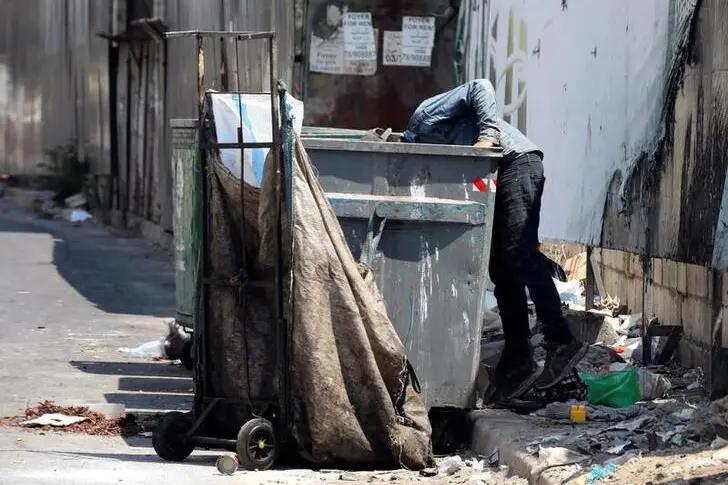PHOTO
BEIRUT: Garbage spilled over into the streets of Lebanon Tuesday as over 280 migrant workers went on strike for the third day against Lebanese waste management company RAMCO for failing to pay salaries in dollars.
RAMCOs director Walid Bou Saad told The Daily Star that the company had started paying the workers in Lebanese pounds as of Nov. 2019 because the government and Beiruts municipality stopped paying the company in dollars.
The government owes the waste management company $7 million, according to Bou Saad, who said that Beiruts governor Tuesday promised that he will pay us a portion today which will hopefully solve part of the problem.
Bou Saad said RAMCO would be expecting $6 million by the end of the day, paid in Lebanese pounds from the government, which will have lost over 80 percent of its value amid the worst economic crisis Lebanon has seen since the civil war.
Beiruts Governor could not be reached for comment.
Still, Boud Saad said, This amount is sufficient to pay salaries and diesel for now, but it is not sufficient to stabilize the operation and keep it running for a long time.
We still have to pay for maintenance and spare parts, which is all in dollars and we dont have the ability to buy dollars.
Although the local currency is currently trading at LL8,800 to the dollar, many employers are paying employees in Lebanese pounds based on the official exchange rate of LL1,500 to the dollar rather than the parallel market exchange rate.
This means that some migrant workers who were previously paid an already low $150 a month or its equivalent in Lebanese pounds are now only receiving 20 percent of their salaries.
Because of the collapsing economy, Bou Saad said that around 200 workers from Bangladesh have requested to be flown home, but that the company was having trouble securing flights due to coronavirus lockdown measures.
We booked three flights for 120 workers to Bangladesh and all three were cancelled, I dont know why, Bou Saad said, adding that RAMCO would be paying for the return tickets in dollars.
Bou Saad said the company aimed to recruit Lebanese workers to replace those who want to leave the country.
The current pile up of garbage in cities including Beirut, Metn, Keseruan and Caza, is also exacerbated by an additional 240 of RAMCOs Syrian workers who are currently in quarantine and unable to work. Of these, a whopping 131 tested positive for coronavirus Sunday, contributing to the highest single day jump since the virus was first detected nearly five months ago.
The Red Cross transported the employees who tested positive to a location in Beiruts Karantina neighborhood to be quarantined.
Lebanons estimated 250,000 migrant workers are especially vulnerable both to coronavirus and to its economic impacts. Risk of infection is worsened by factors including overcrowded living spaces, limited access to social protections, precarious working conditions, and low salaries made even worse by the steep depreciation of the national currency.
Castro Abdallah, Head of the General National Federation of Trade Union of Workers and Employees in Lebanon (FENASOL), said that RAMCO workers were also refusing to work because they feared for their safety.
These workers are most exposed to illness and bacteria and are working and living in poor conditions, Abdullah said.
Over three months ago around 400 migrant workers from Bangladesh and India went on strike for failure to receive their salaries in dollars. The company had agreed to marginally increase salaries by considering the exchange rate to be LL1,800 to the dollar.
Bou Saad had previously said that RAMCO supports the workers rights to strike but maintained that Our company cannot pay them in US dollars if the government does not pay us in US dollars.
Copyright 2020, The Daily Star. All rights reserved. Provided by SyndiGate Media Inc. (Syndigate.info).





















